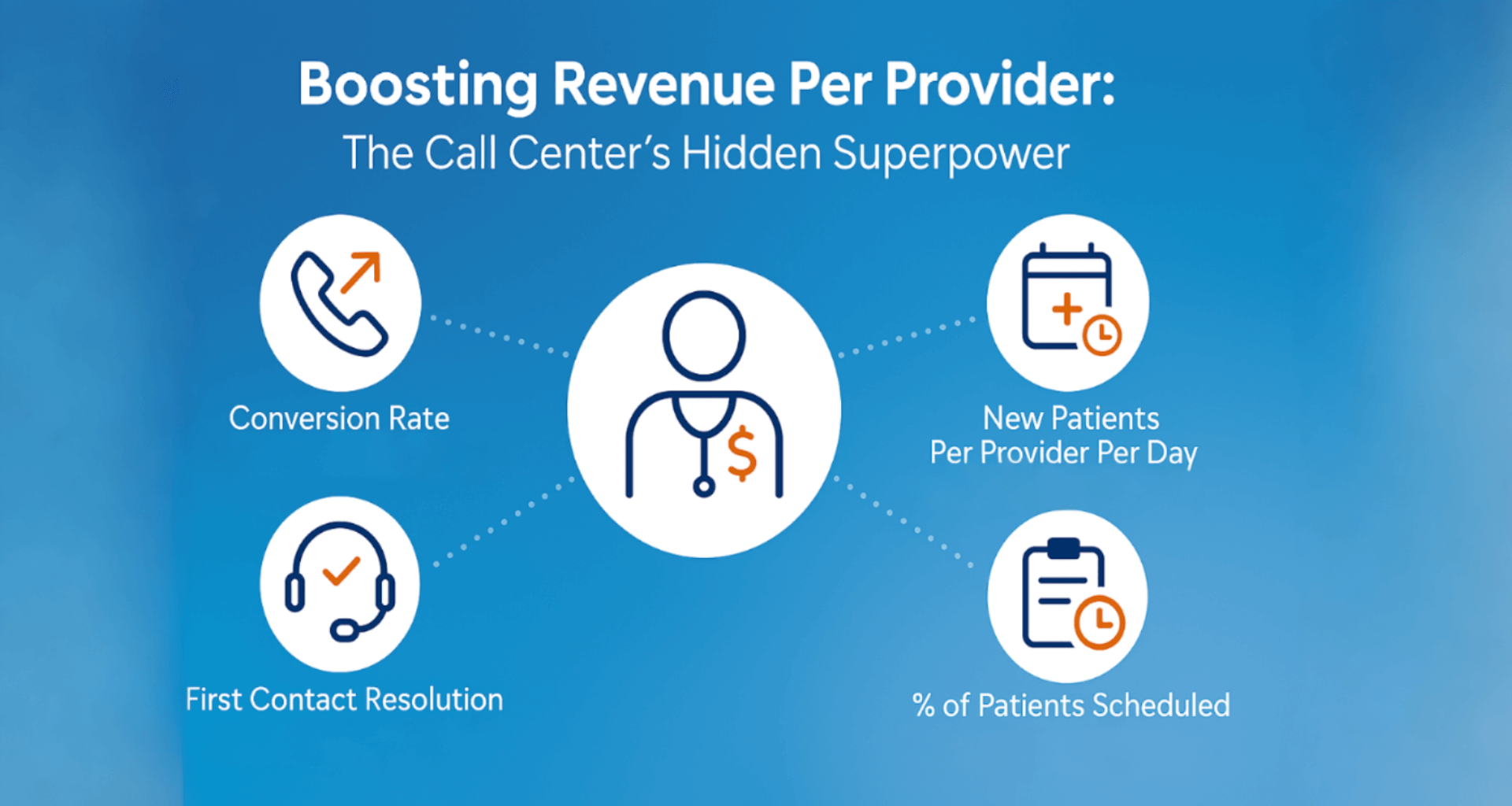
The role of patient satisfaction in healthcare call centers
The frazzled healthcare call center: where the limits of nerves—on both sides of the phone—are tested, hold music haunts patients' heads, and staff are usually overwhelmed by the flurry of tasks they must navigate—on their computers, on their headsets, with their coworkers.
The end result is often frustrated patients who don't get the care they need, annoyed providers who don’t trust their staff, and burnout staff who quit.
Research has shown that the dimensions of service quality, particularly those measured by the SERVQUAL model, which includes tangibles, reliability, responsiveness, assurance, and empathy, significantly affect patient satisfaction. This model stresses the importance of both perceived and expected service quality, with a significant positive relationship existing between SERVQUAL determinants and patient satisfaction (Emerald Insight).
But healthcare isn't like other industries. Healthcare, because of its unique complexities, requires a different approach to customer service. Many healthcare contact centers are shackled by bad habits, and these bad habits prevent these organizations from modernizing their patient access systems.
These bad habits include:
- Overloading staff with different tools, which leads to burnout and turnover.
- Ignoring the need for specialized cross-training that addresses the unique demands of healthcare communication and patient calls.
- Relying on ‘tribal knowledge': the undocumented, collective knowledge and practices shared informally among employees.
Many medical call center leaders mistakenly believe that hiring more staff will solve their problems, but this is equivalent to putting a band-aid on a broken leg.
Some contact center managers think their staff's attitude or incompetence drives poor service. In reality, their staffers are usually demoralized and sluggish because their workflows are too complex and difficult. For these staffers to be confident and energized, their jobs must be easier and more gratifying.
Research by Gallup shows that companies with highly engaged employees outperform their peers by 147% in earnings per share, emphasizing the significance of employee satisfaction and engagement in delivering exceptional patient experiences.
What is a perfect patient experience in a healthcare call center?
Picture this: a frantic mother calling in the dead of night, her child running a fever and she's at her wit's end. She dials the healthcare provider or call center number, half-expecting to be put on hold for eternity. But instead, she's greeted by a calm, reassuring voice at the other end of the line. The call center agent listens attentively, provides clear guidance, and offers some much-needed empathy. The mother hangs up feeling heard, supported, and knowing what to do next. And the call center agent hangs up the phone feeling like they've done something meaningful—because they have.
A study by the Customer Contact Council found that reducing customer effort—the work they must do to get their problem solved—increases customer loyalty by 94%, underlining the importance of simplifying processes and reducing the burden on both patients and call center staff. (Source: Harvard Business Review, “Stop Trying to Delight Your Customers.”)
Inbound calls at a healthcare contact center are a rollercoaster of emotions and challenges. From helping patients navigate their insurance coverage to providing urgent medical advice for urgent calls, every call is a whirlwind of problem-solving.
Here's how you know that your healthcare or contact center solution has achieved success:
- Patients become loyal advocates for your clinic.
- Your team has synergy, with each member playing their part.
- Efficient operations that boost revenue.
When patients feel cared for and valued by healthcare professionals, they are more likely to trust the advice given, follow through with treatment plans, and ultimately have better health outcomes. It's because medical contact centers are not just about answering calls and ticking off boxes; it's about human connection and making a meaningful impact on someone's well-being.
All service is care. And the call center is thus the hub of patient care.
How healthcare call centers can transform the patient experience by creating better staff experiences
In today's on-demand world, creating seamless consumer experiences is not just a nice-to-have; it's a necessity for healthcare clinics to be successful. But how do we achieve this in a way that is intelligent, professional, and truly impactful?
One key strategy is to incorporate user-centric design principles in the healthcare call center software itself, placing the needs and preferences of staffers, employees, and providers at the forefront of every decision.
For example, a healthcare organization might utilize a user-friendly CRM platform that guides staffers to the optimal decisions during their calls, which in turn streamlines appointment scheduling and prescription refills for patients. Or they might integrate a CRM with their electronic health record system to enable easier access to key data so patients receive more personalized care. Smooth patient experiences are a direct result of smooth staff experiences.
For example, a busy working mom needs to schedule a follow-up appointment for her daughter, who had been experiencing some concerning symptoms. Instead of spending hours on hold with the doctor's office, Amy is immediately connected with an agent who knows her daughter’s health and appointment history so that the follow-up visit can be quickly scheduled with the right provider.
This level of convenience not only empowers patients like Amy, but it also lightens the load for care teams. With easy access to patient information and streamlined patient communication, staffers can focus more on delivering exceptional care and less on administrative tasks.
By embracing technology and streamlining processes, we can truly empower patients and care teams to take charge of their healthcare experiences. It's all about making life easier for everyone involved.
This is what your healthcare call center should and can look like:
- A well-oiled machine, where every cog turns smoothly.
- Technology that enhances care quality at every touchpoint.
- Rock solid trust between patients and providers and support staff.
Additionally, organizations can prioritize open and transparent communication, offering regular feedback opportunities and actively seeking out suggestions for improvement. This not only fosters trust and loyalty among patients, employees, and providers of healthcare services, but also allows the organization to continuously evolve and adapt to meet their ever-changing needs.
Remember, creating better experiences is about real, tangible results. By intelligently integrating user-centric design, quality management, and prioritizing open communication, organizations can make a lasting impact.
Learn which patient experiences build loyalty & trust
At the heart of every great healthcare experience lies trust and loyalty. Think about it: You wouldn't recommend a doctor who made you feel like just another number on the assembly line, right? No, you'd rave about the one who truly listened, who took the time to understand your unique situation, and who made you feel like a VIP in the ER.
The same is true for call center experiences. Patient loyalty and trust are built on the little things, the moments that make a lasting impression. It's the nurse who remembers your name, the agent who explains complex medical jargon in a way that makes sense, and the compassionate staff who go above and beyond to make your experience as painless as possible.
Experiences like this show patients that they're more than just a chart. That they are real people with fears, hopes, and preferences. It's the moments of genuine care and kindness that turn patients into loyal patrons of practices.
Deliver secure, connected experiences at every touchpoint
In a world where digital interactions are the norm, delivering secure, connected experiences at every touchpoint is no longer just a trend, but a necessity. Imagine this: you're shopping online, and as you browse through products, the website seamlessly recognizes your preferences and offers tailored recommendations. When you finally make a purchase, the checkout process is frictionless and secure, giving you peace of mind.
Now, let's talk about banking. You seamlessly transition from using a mobile app to connecting with a customer service rep on the phone, and your experience remains consistent and secure throughout. You expect nothing less in today's consumer-centric age.
Whether it's in retail, finance, or healthcare, providing a seamless, secure, and connected experience is essential for building trust and loyalty with customers. It's a reflection of a company's commitment to prioritizing satisfaction.
To achieve this, healthcare providers must prioritize safety and cybersecurity, invest in AI technology, and be proactive in addressing weak spots in their patient journeys. By delivering on these expectations, clinics can build lasting relationships with their patients and stay ahead in an increasingly competitive landscape.
Patient journey management & medical call center services
Patient journey management is like orchestrating a symphony where each note is perfectly timed and harmonized. From scheduling appointments and receiving reminders, to navigating to the facility and clinical care, every step should be frictionless and coordinated.
Consider an example: A patient with a chronic, complex condition requiring regular check-ups and medication refills. With effective patient engagement and journey management, this patient would receive timely reminders for appointments, have a clear understanding of the necessary steps for medication refills, and experience minimal wait times when they call with any questions about their complicated treatment plan.
Trust in patient journey management is crucial, just as a composer trusts the conductor to organize and synchronize the musicians. Patients trust that their needs will be met efficiently and compassionately throughout their healthcare experience.
Ultimately, effective patient journey management not only improves patient satisfaction, but also leads to better health outcomes. When patients feel supported and guided through their healthcare journey, they are more likely to adhere to treatment plans and engage in preventive care.
Patient journey management is a key component to providing a positive and impactful healthcare experience. It requires careful planning, clear communication, and a commitment to putting the patient at the center of care.
Final thoughts: redefining patient care through every call
Process mapping of the patient journey can improve the coordination of care and maximize clinical efficacy, according to a study from The BMJ. By focusing on activities most valued by patients, healthcare providers can eliminate ineffective care and significantly enhance the quality and efficiency of clinical management.
Healthcare call centers are more than just cost centers; they're the lifeline of patient interaction. It's clear that these contact centers have the potential to turn routine calls into crucial touchpoints of care. This transformation demands a blend of advanced technology and genuine empathy.
Adopting user-centric designs and smart CRM software can make interactions smoother, enhancing satisfaction for both patients and staff. These tools streamline processes and infuse each call with the care patients deserve, building a foundation of trust and loyalty that's essential for effective treatment outcomes.
In healthcare, every call is a chance to make a difference. Let’s ensure we seize these opportunities with the utmost dedication and compassion, reshaping patient care one call at a time.
Posted By

Stephen Dean is COO of Keona Health, where he’s spent 13 years building AI systems that transform patient access. Before “agentic AI” was a term, his team was deploying autonomous systems that now handle millions of patient conversations annually.
Related Post
July 30, 2025
when patients call, they’re not just dialing a number—they’re reaching for help. and...
April 10, 2025
in healthcare, every interaction is a decision point—one that can impact outcomes,...


